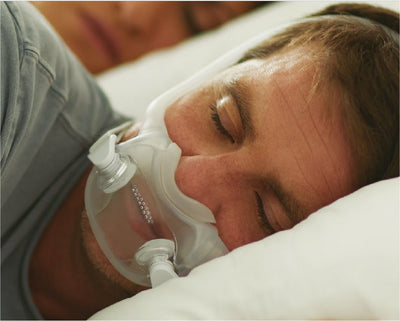Sleep apnea has long been known to have serious long-term health consequences if left untreated. Heart disease, type 2 diabetes, and depression are just a few of the conditions commonly cited as potential outcomes of obstructive sleep apnea.
But obstructive sleep apnea has also been linked with Alzheimer’s disease. This disease, which is the most common form of dementia, can significantly disrupt daily life as it spurs mental decline. Trouble thinking or understanding, memory loss and forgetfulness, confusion, and even behavioral changes are all potential outcomes of this aggressive form of dementia.
While the exact nature of the link between these two conditions is still not entirely understood, a recent study appears to shed more light on the matter, while further proving that there is a connection.
Finding a Connection

As Professor Stephen Robinson, the study’s lead investigator, explained, “We know that if you have sleep apnea in mid-life, you're more likely to develop Alzheimer's when you're older, and if you have Alzheimer's you are more likely to have sleep apnea than other people your age…The connection is there but untangling the causes and biological mechanisms remains a huge challenge.”
To try to better understand this link, researchers examined the brain tissue of individuals who had been diagnosed with obstructive sleep apnea. None of the individuals had been diagnosed with Alzheimer’s, but researchers found amyloid plaques and neurofibrillary tangles within their brains — and in the same locations where these plaques and tangles typically appear in Alzheimer’s patients.
Notably, the more severe a patient’s sleep apnea had been, the more tangles and plaque buildup there was. However, even in patients with mild sleep apnea, plaques and tangles had formed in the same area where they are known to first form in Alzheimer’s patients.
In the research team’s paper, they noted, “Thus, [sleep apnea] may render these areas more vulnerable to the (as yet unknown) causative agent in [Alzheimer’s], thereby facilitating the pathogenesis of this disease. This is supported by our previous findings of reduced hippocampal volume in the same brains.”
While the results of the study still need to be expanded to larger groups, these findings seem to demonstrate that oxygen deprivation that occurs during sleep apnea spurs the development of the toxins that lead to Alzheimer’s disease.
Taking Action to Mitigate Sleep Apnea

Because obstructive sleep apnea can have such a harmful impact on both physical and mental well-being, it is essential that patients get it under control. The vast majority of sleep apnea cases are undiagnosed, which means the first step is testing.
Common signs that you should be tested for sleep apnea include morning headaches and sore throat, feeling exhausted even after getting a full night’s sleep, loud snoring, and waking up in the middle of the night choking or gasping for breath. Home sleep studies are now available, in which you use a wearable device to monitor your sleep patterns.
If you are diagnosed with sleep apnea, the most commonly recommended solution is to use a CPAP machine. CPAP machines provide a steady flow of oxygen throughout the night, keeping your breathing passages from closing off. The results of your sleep study will typically determine the air pressure setting that is right for you.
In addition to using a CPAP machine, you can improve your sleep quality by sleeping on your side rather than your back, exercising during the day, and avoiding screen time, alcohol, or caffeine in the hours before going to bed.
Fighting Against Alzheimer’s

The exact reason why someone could develop Alzheimer’s disease is not entirely known. This recent study implicating sleep apnea represents just one of several factors that could contribute to the progression of dementia. Family history and genetics are believed to play a role, as well as prior head injuries and poor heart health.
Because Alzheimer’s has been connected with other health conditions like high blood pressure, high cholesterol, and heart disease, it is essential that you take steps to keep your body in good shape as you age. Consistent exercise and eating a balanced diet will help prevent or improve these conditions, subsequently decreasing your risk for Alzheimer’s.
Keeping the mind active and engaged can also reduce the risk of developing Alzheimer’s. Being socially active, reading, participating in volunteer organizations, participating in group activities, and learning new skills or hobbies can all help you stay mentally active.
Essentially, your best plan of attack for preventing Alzheimer’s is to make lifestyle choices that promote healthy aging. By consistently caring for your body and mind, you can reduce your risk — and enjoy your daily routine that much more, too.
Let Help Medical Supplies Help You!
Even though the connection between obstructive sleep apnea and Alzheimer’s disease is still not entirely clear, there is no denying that those who have been diagnosed with this sleep disorder must take steps to control it.
Unfortunately, those who do not have health insurance may sometimes forgo testing and getting a prescription for a CPAP machine because of the cost of the equipment. At Help Medical Supplies, we seek to make this process easier for you by offering significant discounts on CPAP machines from leading brands like ResMed and Philips Respironics.
You can save even more with our exclusive CPAP bundles, or you could rent or finance your equipment so you can make affordable monthly payments. We know how important a good night’s sleep is — both on a day to day basis and for your long-term health. Let us help you get the equipment you need at a price you can afford.

